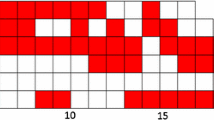Abstract
We study alternative signal designs for electric vehicle (EV) charging control based on vehicle-originating-signals (VOS). In the original VOS approach, the need-for-charge signal is proportional to a ratio between required and available charging times which results in a convex signal. We therefore consider alternative signal designs with different concavity and convexity and compare the results in terms of objective adherence and individual EV benefits. For the evaluation, we compare the original and alternative designs for the VOS approach on a load leveling scenario based on electricity demand, solar generation and car mobility data from Munich, Germany. Results show that significantly concave and extremely convex signals have a negative effect on both the error and the EVs, while linear and adaptively convex signals enable vehicles to achieve higher battery levels at earlier stages of the parking period with no significant effect on the error.






Similar content being viewed by others
Notes
Only two derived metrics (NfC and WtS) are revealed to the aggregator as opposed to, e.g., parking times, SOC or vehicle objectives and constraints.
References
del Razo V, Goebel C, Jacobsen HA (2014) Benchmarking a car-originated-signal approach for real-time electric vehicle charging control. In: IEEE PES ISGT
Gan L, Topcu U, Low SH (2013) Optimal decentralized protocol for electric vehicle charging. IEEE Trans Power Syst 28(2)
Rivera J, Wolfrum P, Hirche S, Goebel C, Jacobsen HA (2013) Alternating direction method of multipliers for decentralized electric vehicle charging control. In Proceedings of the IEEE CDC
Goebel C, Callaway DS (2013) Using ICT-controlled plug-in electric vehicles to supply grid regulation in california at different renewable integration levels. IEEE Trans Smart Grid 4(2)
He Y, Venkatesh B, Guan L (2012) Optimal scheduling for charging and discharging of electric vehicles. IEEE Trans Smart Grid 3(3)
Richardson P, Flynn D, Keane A (2012) Local versus centralized charging strategies for electric vehicles in low voltage distribution systems. IEEE Trans Smart Grid 3(2)
Clement-Nyns K, Haesen E, Driesen J (2010) The impact of charging plug-in hybrid electric vehicles on a residential distribution grid. IEEE Trans Power Syst 25(1)
Galus MD, Koch S, Andersson G (2011) Provision of load frequency control by PHEVs, controllable loads, and a cogeneration unit. IEEE Trans Ind Electron 58(10)
Saber AY, Venayagamoorthy GK (2010) Intelligent unit commitment with vehicle-to-grid—a cost-emission optimization. J Power Sources 195(3):898–911
Huber M, Trippe A, Kuhn P, Hamacher T (2012) Effects of large scale EV and PV integration on power supply systems in the context of Singapore. In: 2012 ISGT Europe
Pratt JW (1964) Risk aversion in the small and in the large. Econometrica 32(1/2):122–136
SWM Infrastruktur GmbH (2013) Netzdaten (Online). http://www.swm-infrastruktur.de/strom/netzstrukturdaten/netzdaten.html
infas / DLR (2010) Mid 2008: Mobilität. In: Deutschland 2008: Nutzerhandbuch
Author information
Authors and Affiliations
Corresponding author
Rights and permissions
About this article
Cite this article
del Razo, V., Goebel, C. & Jacobsen, HA. On the effects of signal design in electric vehicle charging using vehicle-originating-signals. Comput Sci Res Dev 31, 49–56 (2016). https://doi.org/10.1007/s00450-014-0286-4
Published:
Issue Date:
DOI: https://doi.org/10.1007/s00450-014-0286-4




